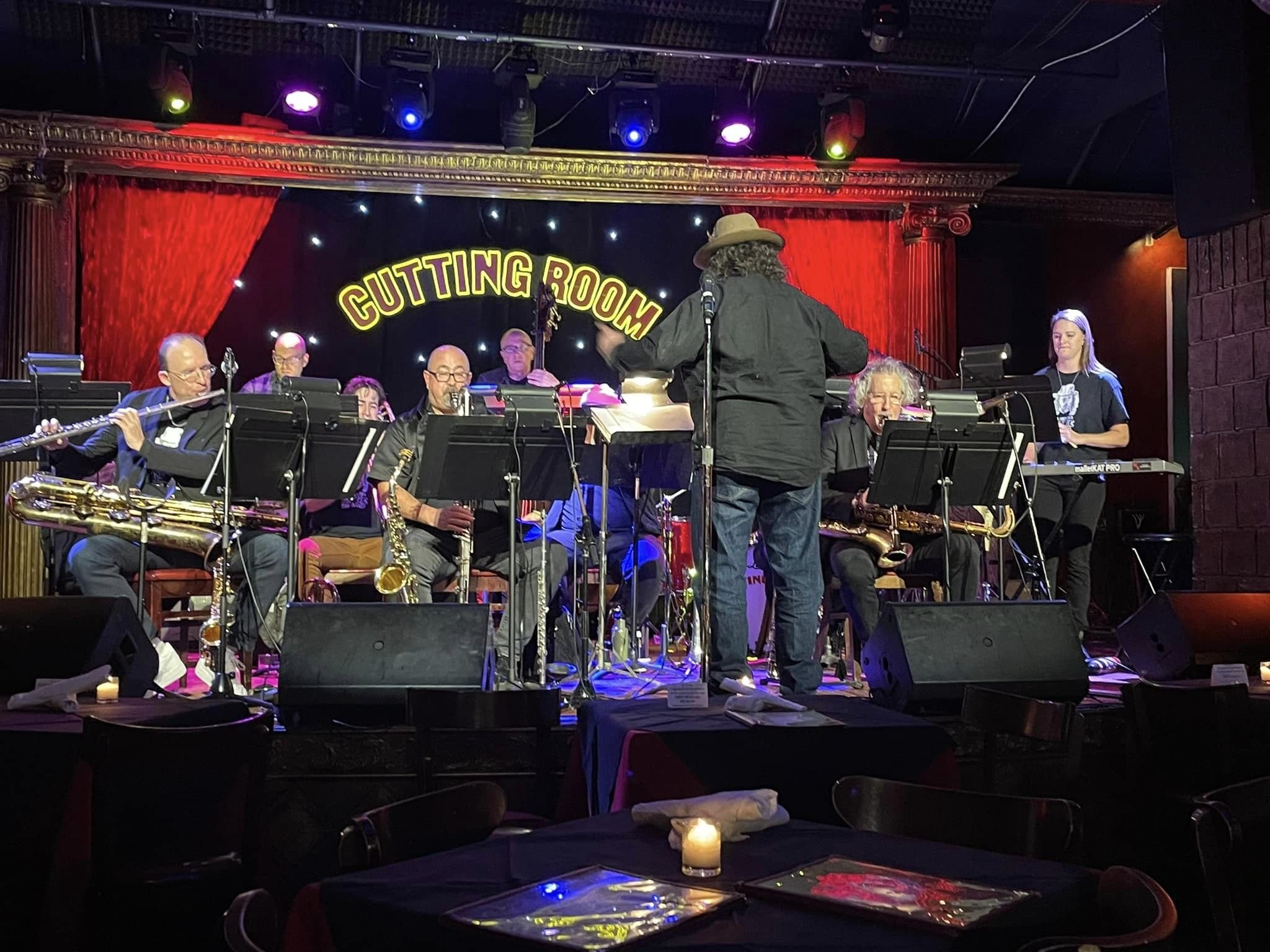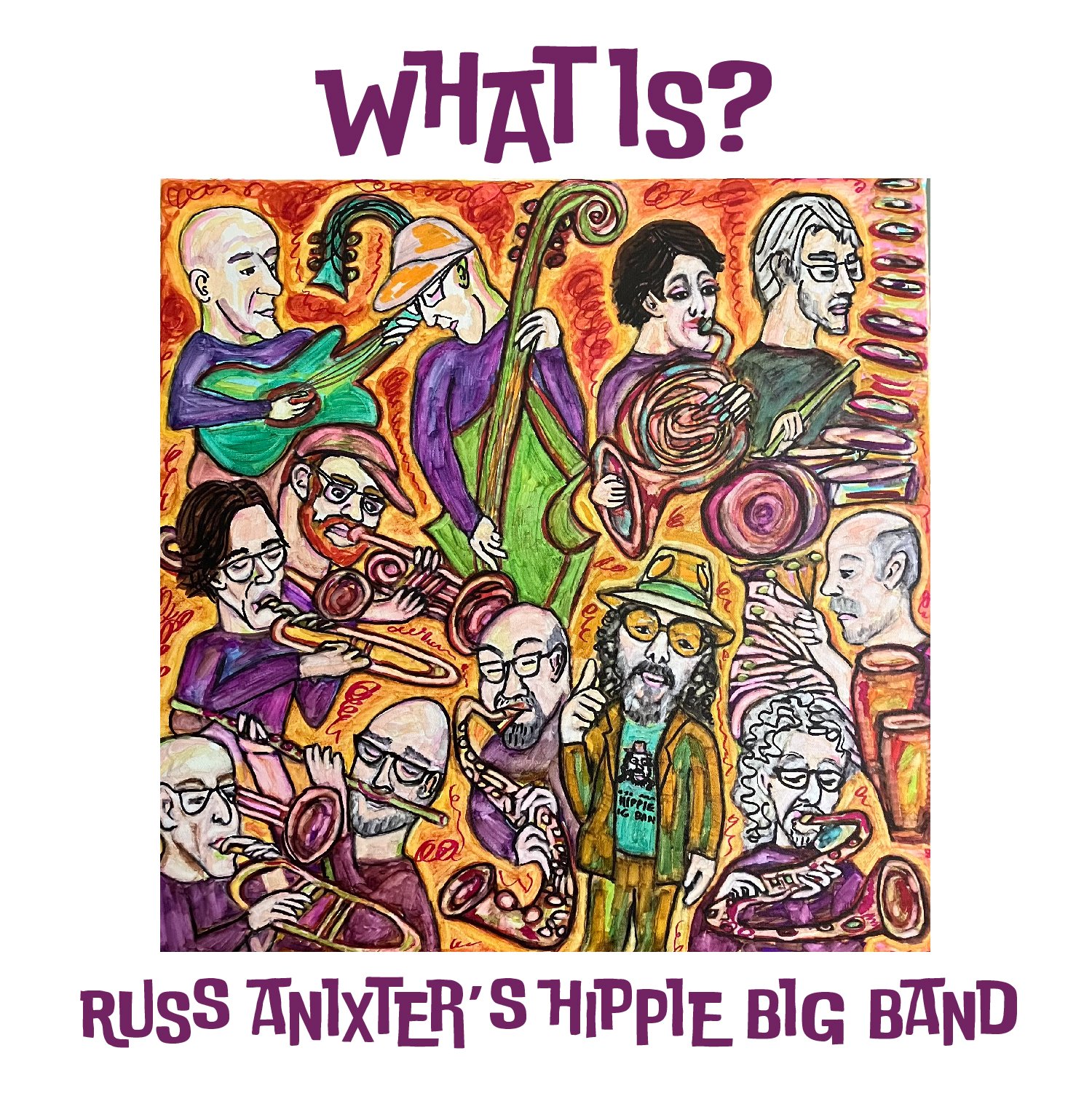Russ Anxiter's Hippie Big Band
•
Russ Anxiter's Hippie Big Band •
Russ Anixter’s Hippie Big Band
For Russ Anixter, putting this band of all-stars together has been a lifelong dream!
Russ, a composition and arranging student of jazz great Manny Albam, has been a fixture in the NYC music scene for the last 30 years as a music copyist and arranger preparing music for large jazz ensembles, orchestras, studio recordings, musical theater, and Radio City Christmas.
Russ’ arrangements for this eclectic 11 piece ensemble include music by Miles Davis, Weather Report, The Grateful Dead, Little Feat, Led Zeppelin, Jimi Hendrix along with jazz and funk classics fusing together disparate styles; sometimes within the same arrangement.
The Hippie Big Band is composed of NYC’s finest studio, jazz and Broadway musicians. Collectively band members have played with diverse artists such as Ray Charles, Frank Sinatra, They Might Be Giants, Levon Helm, Natalie Cole, Bruce Springsteen, Blood Sweat And Tears, Aretha Franklin, David Byrne, Quincy Jones, Michael McDonald, Donald Fagan, Boz Scaggs, John Scofield, Toshiko Akiyoshi, The Vanguard Jazz Orchestra, The Mingus Big Band, The Gil Evans Orchestra, The NYC Ballet, The NY Metropolitan Opera Orchestra, and Rudy Ray Moore aka Dolomite!
The band’s performances include playing to enthusiastic audiences at NY’s Bitter End, Chelsea Table and Stage, The Cutting Room, and a concert in the Central Park Bandshell.
Russ Anixter’s Hippie Big Band “What Is?”
What is? A collection of my arrangements for Russ Anixter’s Hippie Big Band represents my love and background for big band jazz and rock groups that improvise. Smaller than a traditional big band, but bigger than a combo, we are a jazz band that plays rock music. Ok, we also can play straight ahead jazz, funk, pretty ballads and free form improvisations. Sometimes within the same arrangement.
Since graduating from Manhattan School of Music in 1992 with a master degree in jazz and commercial composition, I’ve been a music copyist on the New York City music scene preparing music for Broadway shows, regional theater productions, Radio City Christmas, recording sessions, and live concerts. In this time studying other arrangers scores (while getting paid for it) I’ve had the opportunity to further hone my music crafts. With the size of musical orchestras shrinking over the years I’ve seen how smaller groups can sound bigger, and learned how different combinations of instruments can work together.
HIPPIE BIG BAND ORIGINS
Since my teenage years I’ve been divided by my music interests, and the Hippie Big Band has allowed me to find my voice combining all of my musical experiences.
I grew up in San Francisco during the 1960s, and was attracted to bands like the Grateful Dead, Santana, and other bands that incorporated improvisation and blues into their music. I didn’t understand the improvisation at that time, but I know I liked something about it. At the same time I was learning to play trombone, and finding myself drawn to jazz. Big Bands in particular. In college, and after graduating, I played trombone in big bands in the San Francisco Bay Area, listened to a lot of jazz, but still had that love for rock music that included elements of improvisation. It wasn’t until much later that I’d heard that Miles Davis once described the Grateful Dead as a jazz band that plays rock.
Graduate school at the Manhattan School had me studying jazz composition and arranging with the great Manny Album. I started writing traditional and contemporary big band music, and on a lark I did an arrangement of a Jimi Hendrix song for a big band. Something about that spoke to me, and with encouragement I arranged several Jimi Hendrix and Led Zeppelin songs for big band. The arrangements were performed in concert and in New York clubs to some acclaim; however, at that point I got very busy as a music copyist in New York City. I eventually opened my own music copying office preparing music at a very high level. While I did manage to compose a few things over the next few years, my own writing projects pretty much became less of a priority.













